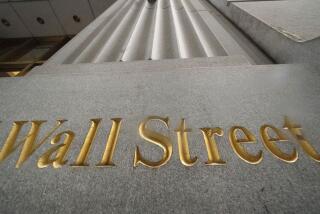News of Kia Bailout Sends S. Korean Stocks Soaring
- Share via
TOKYO — After taking a hands-off stance for months, the South Korean government reversed itself Wednesday and said it will take control of debt-ridden Kia Motors Corp. in the largest corporate bailout in Korean history.
News of the $760-million rescue plan, which addresses a core problem that had damaged the country’s economic outlook, resulted in the biggest one-day gain ever seen in Seoul’s stock market on Wednesday, and the surge continued today.
The benchmark Kospi index soared 35.1 points, or 6.2%, to close at 601.93. Bank stocks as a sector surged 7.4%. In early trading today, the index jumped 13.07 points further, or 2.17 %, again led by banks.
“The quick end of the Kia trouble is the most urgent task to stabilize financial markets and to improve confidence in our economy,” Finance Minister Kang Kyong Shik told a news conference.
Kia Group--the auto maker’s parent company and the eighth-largest conglomerate in South Korea--has been floundering amid $10.3 billion in debts. A special anti-bankruptcy protection period agreed to by its creditors expired Sept. 29. Kia then sought court protection from creditors to allow it to restructure its debts and keep its current management, but the court has not acted on the request.
Concern that a Kia failure could have a ripple effect that would wipe out or damage many of its suppliers and creditor banks has been weighing down South Korea’s economy. The stock market index hit a five-year low this month, and economic growth is projected at 5.8% this year, down from 7.0% last year and 9.0% in 1995.
“The Kia situation triggered all these recent financial problems,” said James Son, an auto industry analyst at SBC Warburg Securities Ltd. in Seoul. “In that sense, the fact a decision was made in the Kia case is important because it eliminated that uncertainty. And it’s important because it had a very positive effect on the banking sector.
“But it hasn’t changed anything fundamental. I don’t think today’s measure solves all the economic problems. It’s going to help economic recovery, but the South Korean economy still has fundamental structural problems.”
The bailout plan calls for the government-owned Korea Development Bank to exchange about $320 million of its loans to Kia for a 30% equity stake in Kia Motors. Creditors will also provide new loans, bringing the total package to $760 million. Another Kia Group subsidiary, Asia Motors Co., a smaller maker of commercial vehicles, is to be put into receivership and then taken over by a still-to-be-determined third party.
About 20,000 workers at Kia Motors and Asia Motors immediately went on strike to protest the plan. Today, other industrial unions threatened to join them.
“Call off the court receivership decision and unveil the truth behind the malicious plot,” the Korea Automobile Workers’ Federation demanded in a statement.
The union charges that Kia may eventually be sold to Samsung Group, which is building an auto plant in the southern port city of Pusan in preparation for entry into the auto business in March. Pusan is President Kim Young Sam’s main base of political support, and many Kia workers suspect that the company’s troubles have been orchestrated partly to help Samsung break into the business.
“Unless the government withdraws its decision, we will fight to the end, using every possible measure, including a full strike from next week,” said Kim Seung Ho, a spokesman for the 62,000-member federation, which represents workers at most of South Korea’s big auto firms.
Public opinion in Seoul, however, seemed to favor the rescue plan, and there were widespread doubts that any strike action could win broad support or be successful.
The bailout plan will make the state-owned bank the controlling shareholder in Kia Motors, in effect nationalizing the country’s second-largest auto maker. Currently the biggest Kia Motors shareholder is Ford Motor Co., which has a direct equity stake of 9.39% and owns an additional 7.52% through its Japanese affiliate, Mazda Motors Corp.
Kang said that the new government formed after South Korea’s Dec. 18 presidential election will decide whether Kia Motors should remain a state-run firm or whether the Korea Development Bank should sell off its stake.
Another factor that had been weighing on economic sentiment was cleared up Tuesday when prosecutors announced that they would not conduct any preelection investigation of “slush fund” allegations made by the ruling party against longtime opposition leader Kim Dae Jung, who is leading in presidential-campaign polls.
* Chi Jung Nam of The Times’ Seoul bureau contributed to this report.
More to Read
Inside the business of entertainment
The Wide Shot brings you news, analysis and insights on everything from streaming wars to production — and what it all means for the future.
You may occasionally receive promotional content from the Los Angeles Times.










